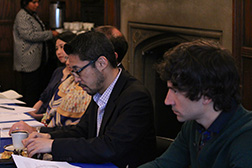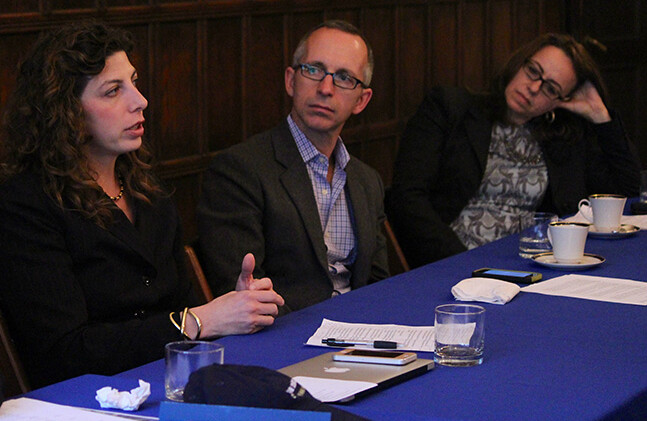Republished with kind permission from the Melton Foundation.
On April 30, 2014, Carnegie Council for Ethics in International Affairs and the Melton Foundation convened a group of representatives of leading global networks to investigate and share best practices. As the world becomes ever more connected and with new networks seemingly being launched every day, this meeting was a way for organizations with global networks to pinpoint good practices, challenges, and solutions to successfully deploy networks across countries and continents for transformative change.
A free-ranging conversation, spanning the role of "cruise directors" to encourage social interaction among network members/communities to the critical need for shared values to inform a network's cohesiveness, produced the following key takeaways and framework for operating as networks.
Framing Discussion with Rachel Kleinfeld
Rachel Kleinfeld, founder of Truman National Security Project, kicked off the conversation with a discussion framing the roles and values of networks. Networks generally fall into either of two categories: 1) Networks that are organized around solving a problem or idea, or to do a specific thing; or 2) Networks that are organized around people who have a common set of values, who then go on to do many different things, embodying the philosophy of "let a thousand flowers bloom."
Rachel discussed some of the steps she took that led to the Truman Project's success:
1. Start with the best, highest quality people. These people had to be effective doers and also work well with others. The emphasis in terms of "quality" was on people who had demonstrated their motivation to do things, rather than on college degrees or other such benchmarks.
2. Do not compromise values that unite the network. Do not compromise on personal ethics ("no tools" rule, i.e. limit distracting forces, whose values are not aligned with the rest of the network).
3. A network is really just a community of people, with emphasis on personal relationships and a shared culture. It's important to provide space and time for real friendships and personal interaction with "cruise directors" encouraging social interaction.
4. There must be activities-driven engagement. Effective networks cannot just be a group of "thinkers"—they must have a shared goal and means to achieve that goal.
5. There must be room for serendipity, "meetings of minds," and open-ended dialogue.
Key Discussions and Take-Aways Quality and Diversity
The discussion centered on ensuring both high quality and high diversity of network members, answering the question, "How do we create a group that is 'elite' but not elitist, excludes the 'divas,"'and avoids re-creating circles of the same elite groups?" Answers included: enact an endorsement process, let in members who aren't necessarily members of the most selective institutions (accomplishments are more important than school affiliations), "self-nominations" (letting people come to the network themselves), and saying explicitly to members, "Diversity is important. We don't only want to bring in more people exactly the same as you."
Our Role as Network Conveners
This discussion focused on a network's shift in culture and norms from a "global, elitist fraternity" to an externally oriented group of change agents. This involves identifying what particular groups are capable of creating one cohesive team. Metrics can be helpful to measure who is doing what (and can be complex or simply through the use of Excel).
Collaboration vs. Competition
 How do we ensure collaboration within a network vs. competition between network members? Many participants agreed that this takes continuous effort. Signed agreements, peer reviews, discussions, and pressure from network directors can help. Creating a sense of community helps overcome adversity. "Branding" the network can help, but also makes it harder to ensure people are joining for the right reasons (vs. those who are joining exclusively for branding themselves through affiliation with the network). Creating "shared experiences" through face-to-face connections is important. Finally, creating a sense of transparency on the side of the network coordinator is important throughout the selection process and managing funders and donors.
How do we ensure collaboration within a network vs. competition between network members? Many participants agreed that this takes continuous effort. Signed agreements, peer reviews, discussions, and pressure from network directors can help. Creating a sense of community helps overcome adversity. "Branding" the network can help, but also makes it harder to ensure people are joining for the right reasons (vs. those who are joining exclusively for branding themselves through affiliation with the network). Creating "shared experiences" through face-to-face connections is important. Finally, creating a sense of transparency on the side of the network coordinator is important throughout the selection process and managing funders and donors.
Technology: Virtual vs. In-Person Collaboration
The group discussed technology briefly, highlighting the difficulties connecting members who live in different countries and time zones; "the limit of technology is that it's not global" (i.e. WhatsApp vs. WeChat each used more widely in different countries). This is a major barrier, but also a reality we can't change. The only way to overcome this is to meet users where they are and to be inclusive through the use of many different channels.
Next Steps
Could a mini-network of network facilitators result from this convening? The response was a unanimous yes, with plans to have a second Network Discussion in the fall (projected November 2014). Topics for future discussion include funding networks and identifying emerging trends in managing networks.
If you would like to participate in this conversation, please contact any one of the following:
- Winthrop Carty at the Melton Foundation.
- Devin Stewart at Carnegie Council for Ethics in International Affairs
- Jonah Kokodyniak at the Institute of International Education (IIE).





